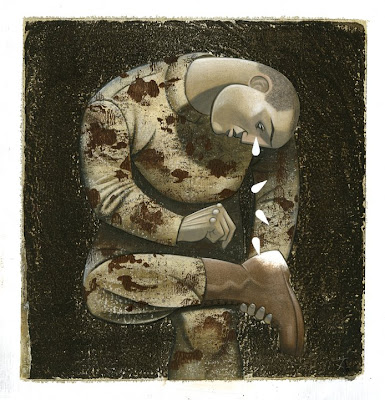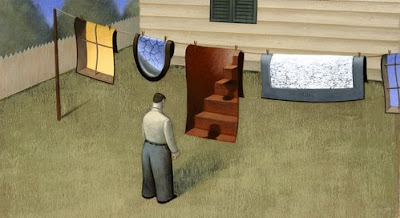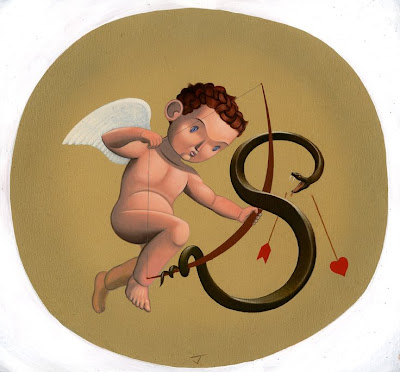 Where are you from and how long have you been illustrating?
Where are you from and how long have you been illustrating?Born, raised, and still live in Philadelphia. I got out of school in 1999 and have been doing this ever since.
Right off the bat, when going to your website up come 3 words: Times, Tones and Temperatures - Im curious about this - what its in reference to etc
Basically these were how my web designers (Red Canoe) chose to organize my work on the site. The different times of the day that I work, color palettes, etc.
According to your bio you grew up drumming - do you still drum?
Im always drumming. I took both drum and art lessons up until about the age of 14 when my mom basically told me to pick one and stick with it.... I guess artist or drummer doesn't exactly sound like two viable career options to most parents. I stuck with art, but continued to hit things with sticks.
Who were you listening to when you go into drumming? (Im semi picturing one of those Tommy Lee double bass drum stacks)
I listened to a lot of different drummers- Bonham, Stewart Copeland, Joe Morello, and Ginger Baker to name a few. I was in high school during the grunge years, so I played a lot of Nirvana, Alice in Chains, and Soundgarden.I actually just got a new kit, not Tommy Lee style, one built for a row home to minimize police involvement.
 I assume you're still teaching - how has that helped you grow as an illustrator / person?
I assume you're still teaching - how has that helped you grow as an illustrator / person?
I actually stopped teaching last year. I might take another teaching job at some point, but for now Im focusing on some other things. Ill definitely miss helping the really hard working and gifted students cultivate their talent. I love seeing the light go on.
I was also very fortunate to have some great people come in to Tyler and present their work in exchange for paltry compensation, praise, and a ride from the train station.
Probably wont miss sending deficiency reports, filling out evaluations, doing gradesheets, or any other paperwork though...
Conceptually your work is above and beyond ... well ... almost everyone - whats your process for brainstorming etc?
Thanks Pete. Basically Ill read the story or brief a couple of times and try and get the simplest essence of what its about, whether its a straightforward story on a subject like love, or something more complex like whether or not mandatory arbitration clauses should be allowed in nursing home contracts (just completed that one today.)Ill highlight words that I think will further the visual, and start sketching out whatever comes to mind. I try and mesh the article with my own visual vocabulary, or whatever Im interested in at the time, and produce as many quality solutions as I can. Sometimes the ideas come quickly, other times its a struggle. Sometimes you might have to go back and forth with the art director on a couple of rounds. Hopefully at the end, one of the sketches grows up to be an illustration
 I remember first seeing your work about 4 years ago - at the time it seemed a bit more painterly - How have you noticed your work changing over time?
I remember first seeing your work about 4 years ago - at the time it seemed a bit more painterly - How have you noticed your work changing over time?
I think I've simplified things a lot, both in how I work and what I paint. Every artists work evolves over time through new experiences. I've never looked back at an old piece and not recognized I did it, although sometimes its so bad I wished I never did it.
Is your work traditionally done, or was it ever for that matter? Its one of those styles that you're almost sure is traditional - but its done so exact that its sometimes good for my self esteem to assume its not
I still work old school. Acrylic paint on paper or wood usually with the rare canvas thrown in when Im feeling ritzy. I occasionally use the computer to finish a job up against a quick deadline but everything originates by hand.
Being as established as you are, do you get more freedom from ADs now to kinda "do what you like" then you did when first starting out?
If there are art directors out there with editors willing to tell artists "do what you like" please pass them my phone number. I think you have to treat every job like its a job interview, because it essentially is, no matter how long you've been illustrating.
 Im not sure if you caught it, but recently Gary Taxali made a post titled "Dont Call Me" - in reference to clients trying to get work for free or having unfair / full rights - have you experienced this much / whats your reaction to this?
Im not sure if you caught it, but recently Gary Taxali made a post titled "Dont Call Me" - in reference to clients trying to get work for free or having unfair / full rights - have you experienced this much / whats your reaction to this? I didn't see the post, but I would think and hope every artist would feel similarly. Illustrating is a career, not a hobby. I think if schools taught the business end more it wouldn't be so prevalent a problem. If illustrators agreed to having their fees driven down and rights grabbed up by voracious corporations, whets left will be a watered down industry devoid of the talent it thrived on.
What, in your opinion is the state / future of illustration
The current state of illustration for me hasn't changed that much in the time period I've been involved in the business. If you ask someone that's been doing it longer, they might have a different opinion.
Because most of my work is editorial, Im definitely worried about the future of magazines and newspapers as a venue for illustration. I hope that if there is a total shift to web content that illustration is still valued and that there will be the same emphasis on design of the e-zine as there was in print.
 Where do you see your work / career going?
Where do you see your work / career going?
To be completely honest, I have no clue. I work a lot, and hopefully that doesn't change for the sake of my mortgage and my dog's treats. I think the more work you do, the more it has a chance to evolve.
I started participating in gallery shows, and I might do more of that. At some point I might teach again in the right situation.
advice for new illustrators?
I was very lucky to have a great teacher in college (Dave Noyes) who taught both the artistic and business side of illustration. One of the most important things he said was that art directors cant hire you if they don't know you're out there. Initially, besides having a strong portfolio, the willingness to go above and beyond in promoting yourself is the most important part of starting your career.
If you are successful in getting work, its essential to know the business side of illustration, which we touched on above. I wish more schools brought in contracts, explained rights, ethics in business practice, etc. so that students would be better prepared.
I guess the best advice would be to ask questions if you don't know. Most illustrators are more than willing to help if they get an email from a student or recent grad looking for a little guidance.
advice for older / established ones?
I still feel like Im learning, so I dont think I would have much wisdom to impart on anybody that's been doing this for awhile.
 All images copyright Jon Krause - have a look at his website everyone: http://www.jonkrause.com
All images copyright Jon Krause - have a look at his website everyone: http://www.jonkrause.com
Thanks Jon, you're the man!!!









































